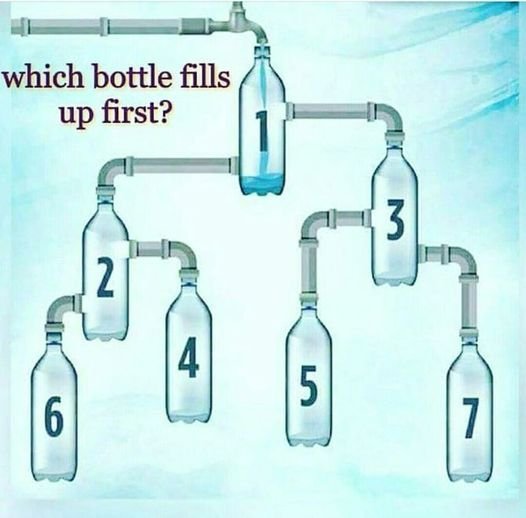Puzzles often present a fun yet tricky challenge, testing our logic and observation skills. The image above is one such brain teaser: a series of interconnected bottles and pipes with the simple question, “Which bottle fills up first?” At first glance, it may seem like an easy problem to solve, but a closer look reveals a more intricate challenge.
Analyzing the Puzzle
To solve this puzzle, we need to consider the path of the water and how the pipes are arranged. Water flows from the top into Bottle 1 and continues downwards, but not all paths are open. Let’s break it down:
- Bottle 1: Water flows into Bottle 1 first. From here, it has the potential to flow to either Bottle 2 or Bottle 3.
- Bottle 2: However, the path leading to Bottle 2 is blocked by a pipe, preventing any water from reaching it.
- Bottle 3: Similarly, the water cannot flow into Bottle 3 because the pipe leading out of Bottle 1 to Bottle 3 is also blocked.
- Bottles 4 and 5: Since the water cannot flow into Bottle 2 or 3, it won’t reach Bottles 4 and 5 either. The paths to these bottles are effectively cut off.
- Bottle 6: Bottle 6, connected via Bottle 2, is also inaccessible because Bottle 2 is blocked.
- Bottle 7: Finally, Bottle 7 is connected to Bottle 3, but since Bottle 3 doesn’t get filled, neither will Bottle 7.
The Conclusion
Given that all other paths are blocked, the answer is straightforward: Bottle 1 fills up first. There’s nowhere else for the water to go, so it continues to fill the first bottle until it is full.
The Fun of Logical Puzzles
Puzzles like this one are a great way to exercise your brain and enhance your problem-solving skills. They challenge you to think critically, observe carefully, and sometimes even see beyond the obvious. While it’s tempting to rush to conclusions, taking the time to analyze each element can lead to the correct answer—and a sense of satisfaction.
So, the next time you encounter a similar brain teaser, remember to break it down step by step. The solution might be simpler than it initially seems!
